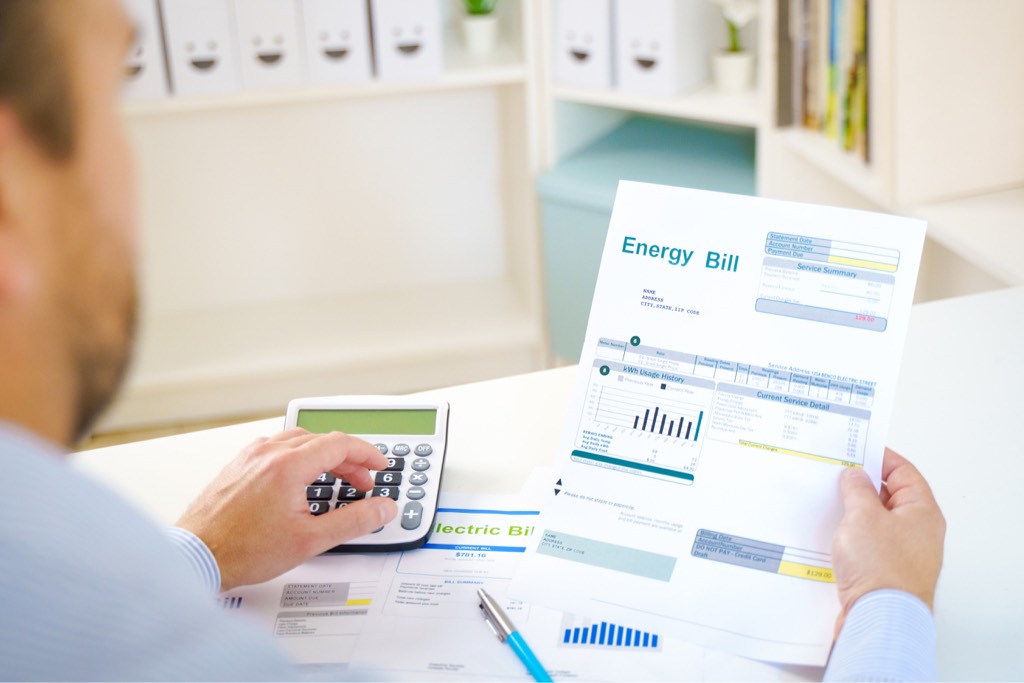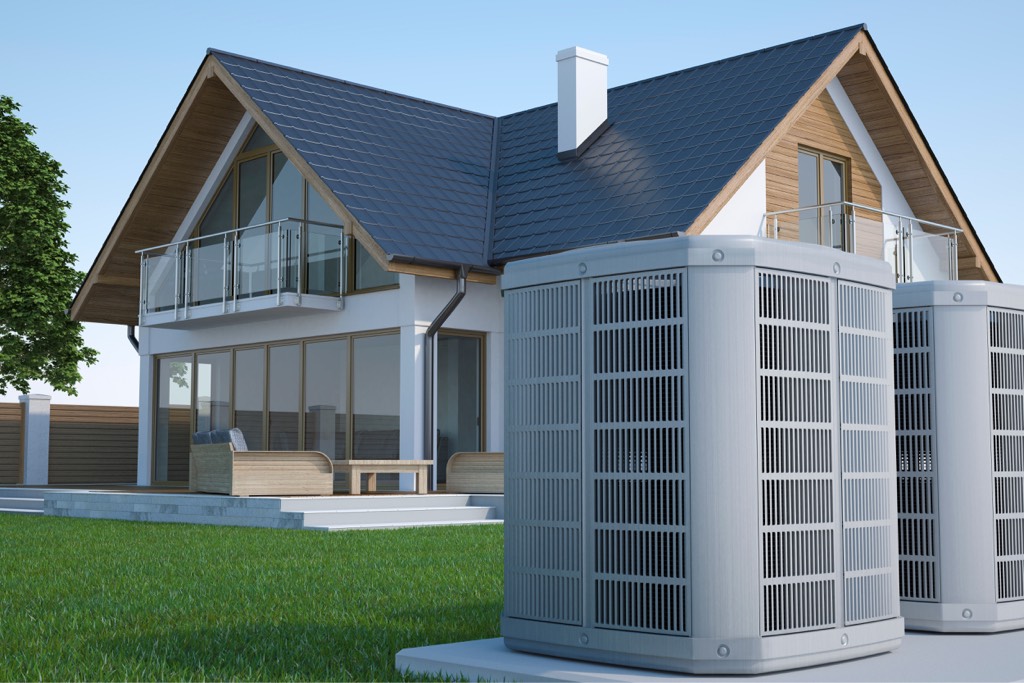Air source heat pumps are great. We love them! But it’s not all upside. We take an honest look at air source heat pump disadvantages and advantages below.
Air source heat pump disadvantages
Initial cost
There’s no denying it. Although air source heat pumps are very energy efficient, and may save you money in the long run, they are expensive to install. The cost can be prohibitive, especially when compared to the cost of just replacing a gas boiler. Unlike a ground source heat pump, there is no groundwork required. But you will still need to install an external air pump and an internal fan or hot water cylinder.
From a cost perspective, air source heat pump disadvantages are linked to a few different things:
Firstly, you need to decide whether to go for an air-to-air system or an air-to-water system. Briefly, an air-to-air system uses fans to distribute hot air throughout your home. It’s cheaper to install, but will not heat your hot water. You will need to have a separate boiler for that. On the plus side you will not have to replace any radiators.
An air-to-water system is more versatile. It will heat your home (via radiators or underfloor heating) and also heat your hot water. But it’s more expensive to install and you may need to upgrade your radiators.
Don’t forget, if you live in an older house (pre 1970s) it is likely that you will also have to make some insulation upgrades. This will improve the heat retention and energy efficiency of your home.
For these reasons, the upfront cost of an air-to-air heat source heat pump can be from as little as £1,600 to £3,100. An air-to-water system on the other hand can cost anywhere from £8,000 to £18,000. You can read more about the installation and running costs of an air source heat pump system in our article How much does an air source heat pump cost?
There is help at hand however. We explain the different types of funding and grants currently available from the UK Government (as of October 2022) to help with the financial burden of switching.
Air source heat pump temperature disadvantages
Air source heat pumps have a reputation for not being as warm as gas. And this is true. They are designed to run at lower temperatures and do not provide the same level of heat. Radiators will not get as warm as they will with your gas boiler.
This does not mean your house has to be cold. But it does mean you will need to optimise your heating system to work with an air source heat pump. Air-to-water systems work best when combining underfloor heating with radiators, rather than radiators alone. Then the temperature achieved will remain consistent. So it’s important to factor in the cost of upgrading your whole heating system if you’re considering making the switch.
Installation suitability
Unfortunately, one of the main air source heat pump disadvantages is that not every home in the UK can accommodate one. This may be because:
- The property does not have practical or adequate outside ground space to fit the heat pump.
- There is insufficient space around the property for effective installation. Pumps need an intake of air. They have to be placed in a location with space all around for operational efficiency.
- External changes, especially to older properties can be difficult, expensive, and extremely disruptive.
- Some properties, especially flats or dormer bungalows, may not have the space to install a water tank or cylinder for the underfloor heating and radiators.
- The property may not be adequately insulated to retain the heat obtained from the system.
- Underfloor heating may not be practicable – especially in older property flat conversions.
- There may not be a suitable space to install the unit e.g. on the ground or a flat roof.
Retrofitting older properties can be just too hard. In some cases, prohibitive costs mean it’s simply not viable and it’s better for the homeowner to look at other options.
Air source heat pump noise disadvantages
Any heat pump by its very nature will create a certain amount of noise. The same is true of air conditioning units. This could be seen as one of the air source heat pump disadvantages.
If you are very noise sensitive or have any worries in this area we would advise you to speak with an installer. They can offer advice, and discuss any things you might do to mitigate the problem.
The good news is that manufacturers are tackling this head on. New models make significantly less noise than the older ones, and the problem is becoming less of an issue.
Cold air from condensers
Another one of the disadvantages of air source heat pumps is that the condenser will blow out cold air. You might see this as an advantage on a hot day in the garden. At other times, it may be a distinct disadvantage, either to you or your neighbours. This is something you should discuss with your installer. They can help make sure that any inconvenience from the blowout of cold air is kept to a minimum.
Air source heat pump insulation
We’ve mentioned it already in this article. But it is essential for your home to be adequately insulated when you install an air source heat pump. This allows you to use every kW of heat the system generates. If your property does not have adequate insulation, you may have to factor in this extra cost before proceeding, and you might consider this one of the air source heat pump disadvantages.
You should bear this in mind when thinking about applying for government grants. For example, in order to be eligible for the Boiler Upgrade Scheme, you must have a current Energy Performance Certificate that has been granted within the last ten years. You can learn more about the different grants available and whether you are eligible in our article; Funding for heat pumps – the complete guide.
Appearance disadvantages
We like to hide our heating appliances away. Gas boilers are not considered beautiful items, so we often place them where they can’t be seen in cupboards or under the stairs. An air source heat pump needs good air flow to operate so it will be visible on the outside walls of your property.
They are similar in appearance to air conditioning units but many people are not prepared for how they look in situ. Some home owners like to disguise their heat pumps with pot plants or small bushes. But this can be difficult in certain situations, for example:
- If the installation is on a flat roof
- If outside space is limited
- If you have a courtyard or paved area, rather than a garden
Regulatory requirements
Unfortunately you do need to consider some regulatory requirements when thinking about the pros and cons of air source heat pumps.
Although not the norm, planning permission may be required in certain instances.
- Installation of the unit should be at least one meter inside the property boundary
- The unit has to be installed on a suitable surface, e.g. on a flat roof, or on the ground
- The maximum capacity of the unit should not be more than 0.6 m3
There is more information on this on the UK Governments legislation.gov.uk site.
Air source heat pump advantages
OK well, that’s enough with the cons. Let’s look at some of the pros with this technology.
Energy costs
This is the big one. Air source heat pumps are much more efficient than other types of heating. On average they produce four times more energy than they use. This means they can save you money on your energy bills. This is especially true if you are changing from an electric, coal-based, or older gas boiler system. It may take a few years to recoup your initial investment, but in the long term you should save money.

Lower carbon footprint
Air source heat pumps are a great option If you are concerned about the environment, or more specifically, the carbon footprint of your heating system. Air source heat pumps do not produce carbon when they are in use. They also do not use gas, coal, or oil, although they do need electricity to run the fan.
If you have solar panels already fitted on your home, your central heating system can be made even cleaner and more efficient by using the electricity they produce. This will reduce your carbon footprint even further.
Maintenance costs
A big advantage of air source heat pumps is how easy they are to maintain. You’ll normally only need to get it serviced once a year. They also have a long lifespan – 20 years in most cases with some models even lasting 25 years.
The life span of a modern gas boiler is only 10-15 years. So you are saving at least the cost of a new boiler and installation over the life cycle of your air source heat pump.
Help with installation costs
There’s no denying it, an air source heat pump is more expensive to install. But there is a lot of help available for the initial upfront investment. For example, if you are eligible for the Boiler Upgrade Scheme, you could receive £5,000 towards the cost of installation.
Heating and cooling advantages
An air-to-air system can work in reverse, like an air conditioner. This can help keep your home cool, while it’s hot outside during the summer months.
Easy installation of air source heat pumps
Generally speaking, the installation process is pretty easy and only takes a few days. It rarely requires planning permission (although it is wise to check with your local authority).
Phasing out of gas boilers
As things stand at the moment, it will not be possible to install new gas boilers in new build properties after 2025. It is worth looking at the pros and cons of air source heat pumps now, so you can start to recoup some of those installation costs.
Don’t forget, government grants are only available on a first-come, first-served basis and these will start to run out as the deadline approaches.
Air source heat pump disadvantages and advantages in summary
Many home owners feel nervous implementing a system that they are less familiar with. It’s always a bit harder to go with something new that something tried and tested. However just because there are a few air source heat pump disadvantages, it doesn’t mean that the downside outweighs the upside.
We hope this article has alleviated some of the worry with choosing an unfamiliar system. For more information on air source and ground source heat pumps check out more articles below.

